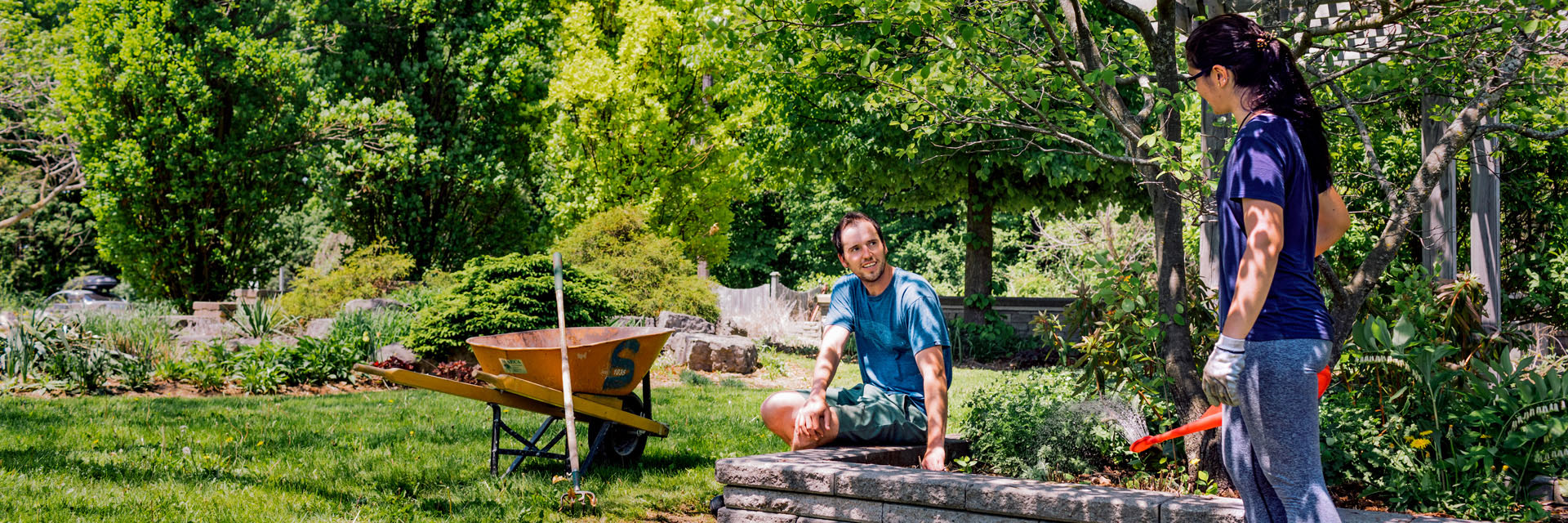Seneca is proud of its employees, faculty, students and alumni who are doing awe-inspiring work in the environmental and sustainability area. Below are some of the highlights:
Stories of Sustainability

Seneca Polytechnic’s campuses are greener than ever, thanks to a City of Toronto grant that helped plant more than 2,600 trees and shrubs.

It’s easy for many of us to look at unused space and envision it becoming something else, such as a playground or a swimming pool.

It’s easy to forget about bees — one of nature’s smaller creatures that have a profound role in food production and biodiversity — but they make a big buzz at Seneca.

Data shows 86 per cent of discarded materials have reuse or recycling potential

Project funded by TD Friends of the Environment Foundation and WWF-Canada

More green spaces to be created for students, employees and the local community

Seneca signs the Sustainable Development Goals Accord

Kristen Berkeley promotes diversity, inclusion of outdoor life through merchandise line

Seneca one of five postsecondary institutions selected for WWF-Canada initiative

Project brings together science, business, sustainability

Seneca announced that it is establishing The Jane Fund, a $12-million investment dedicated to supporting student-focused Equity, Diversity and Inclusion (EDI) initiatives.

Seneca’s Newnham Campus in Toronto will be greener, thanks to new funding from the City of Toronto.

Learn about the initiative launched by a group of eight climate-action leading institutions from all regions of the country.

Learn about a thinning operation that is renewing about 52 acres of forested area at Seneca’s King Campus.

The Philly Pride Flag will be displayed permanently in the Senecentre at Newnham Campus as a symbol of inclusivity and diversity at Seneca.

Learn how one of Seneca’s aging floor cleaners was retrofitted with self-driving technology as part of an applied research project.

The Dumpster Dive exhibit, a collaboration between Sustainable Seneca and the School of Fashion, is raising awareness about textile waste.

Students from the School of Fashion stitched a collection of sustainable, custom-made ribbon skirts for indigenous students to borrow and wear at ceremonies.

In December 2019, Seneca signed a memorandum of understanding with Chio Lecca School of Fashion — Peru's most prominent fashion institute — where Seneca students will participate in a faculty-led program to learn about Peruvian textiles and techniques to naturally dye fabrics.

Learn about on-campus initiatives including the Sustainability Fair, fish harvest luncheon and environmentally conscious maintenance equipment.

All 100 female, accessible and gender-neutral washrooms at Seneca now offer free feminine hygiene products, making Seneca the first and only Canadian postsecondary institution to do so college-wide.

In May 2019, Seneca welcomed the Toronto community to Odeyto and the Stephen E. Quinlan Building as part of the annual Doors Open Toronto event. More than 740 community members visited Odeyto to view its architectural design that reflects Indigenous traditions from the exterior shape to the interior décor.

Farmers of the award-winning Ripple Farms partnered with Seneca’s Faculty of Continuing Education & Training and HELIX to develop a one-day boot camp about vertical farming.

Bill Humber, founding director of Office of Eco Seneca and Co-Chair of the Sustainable Seneca Committee, was recognized with a 2019 Colleges and Institutes Canada Award of Excellence.

The Transforming Our World symposium about sustainable fashion took place over three days at Newnham Campus and included an exhibition showcasing student, alumni and faculty works along with a clothing swap.
Students from Seneca's Sustainable Business Management graduate certificate program created a “waterfall” using hundreds of used plastic drinking bottles.

Brandon Hebor and Steven Bourne of Ripple Farms take home the hardware presented by the Centre For Social Innovation.
Sustainable Business Management students create a holiday tree from used coffee cups at Newnham cafeteria to raise awareness of the litter we generate.

Seneca receives more than $131,000 from Environment and Climate Change Canada to help dry-cleaning operators across the country understand their role in preventing pollution.


